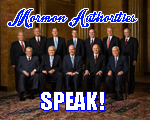September Dawn: A Movie Review
Paul Derengowski, ThM
On August 24, 2007, the movie September Dawn opened play in approximately 1,000 movie theatres across the United States. The movie itself is about one of the most tragic events in American history, as a wagon train of emigrants from Arkansas and Missouri make he harrowing trek across the western plain and mountains, and eventually have to stop and rest in the Mountain Meadows of southwest Utah. It was here in the year 1857 that 120 members of the Fancher-Baker party were systematically murdered, execution-style, by a horde of blood-thirsty Mormons, under the direction of Brigham Young, who was at odds with the United States Government at the time.
The movie itself contains a good deal of fiction to go along with many historical facts leading up to the tragedy. Jon Voight played the fictitious and pompous jerk of a Mormon bishop named Jacob Samuelson. He had to two sons, Jonathan (Trent Ford) and Micah (Taylor Handley), who also play significant roles in the movie. Samuelson and his sons first engage the Fancher-Baker wagon train at Mountains Meadows, where the wagoneers are seeking supplies to continue on their journey to California. After Samuelson sizes the party up, with his son taking a fancy for one of the girls, Emily Hudson (Tamara Hope), he decides to allow the party to stay for two weeks, supplying them with their needs. The relationship between Jonathan and Emily ends up being a central theme to the film, which for Hollywood sake is probably normal, but too much of them ends up detracting from the horrible event for which the movie was really about.
Terence Stamp played the cantankerous Brigham Young, who had such a seething hatred of the United States Government, probably stemming from what he thought were its abuses that led up to the death of Joseph Smith, that he was willing to protect his governorship and territory at the risk of executing the innocent. Although the Mormon Church has never openly admitted that Brigham Young had anything to do with their deaths, it is clear from the film, which opens with Brigham Young being questioned (in court?) about the details about Mountain Meadows, that the director of September Dawn (Christopher Cain) thought he was complicit. Jon Gries, who played John D. Lee (Brigham Young’s adopted son), is ultimately cast as the insidious leader of the final attack at Mountain Meadows. He was not only the liaison between the Paiute Indians, who were hoodwinked by Lee and the Mormons into believing that the travelers were a threat to their livelihoods, but the person who deceived the emigrants into believing that by following him and his men, the travelers would reach safe haven in Cedar City, Utah. Both Stamp and Gries do very good jobs in acting out their roles.
As with any film that has a mix of fiction and documentary history there are certain parts that could have been done better, could have been left out, or were done just right. For instance, all of the fiction about Samuelson, his sons, and Emily Hudson could have probably been left out. Samuelson is depicted as an overbearing dupe that is so controlled and controlling that it is sometimes hard to imagine even the most blind of cult leaders to be so irrational. That is not to say that cult leaders are not irrational, for all of them are to a certain degree. It merely means that Cain perhaps went a little too far in creating this Mormon character to make it believable. Second, the romantic relationship that quickly blossomed between Jonathan and Emily, though possible, was probably overplayed as well. Again, there is nothing wrong with romance in a film, but Mountain Meadows was not about romance. It was about murder. And to include so much of them and their relationship in the film was almost a distraction. One is almost reminded of Jack and Rose in Titanic. Finally, Micah Samuelson, who is Jonathan’s brother, is perhaps overplayed in the final Mountain Meadows scene, where he acts maniacal in his murderous efforts to fulfill his “duty.” Wide-eyed with saliva drooling out his mouth, he goes on a shooting and bludgeoning rampage that Charles Manson might have been proud of. But, then again, he was an impressionable teen under the influences of a murderous religion, and he got his first taste of blood by killing someone point-blank. Hence, between all the immaturity, adrenalin, and freakish ideology, maybe Cain was on to something. It just seemed a little over the top.
From a realistic point of view, Cain does a good job of re-telling the history leading up to the massacre. The Fancher-Baker party was a wealthy party from Arkansas, just passing through on their way to California. Brigham Young and John D. Lee did conspire to have the party executed, mainly because of their antipathy towards the U.S. Government. The Paiute Indians were persuaded to join in on the first attack, after which they distanced themselves from the Mormon bloodlust, having lost several of their braves in the initial assault. Yet, perhaps the most vivid display of reality took place when Lee and the Mormons tricked the innocent party into trusting them with their safety, and then systematically shot, stabbed, and bludgeoned the remaining men, women, and children on the path to Cedar City. In all, 120 of them lost their lives, with only 16 children, all of which were too young to realize what was happening, allowed to live. It was truly an emotional and heartbreaking scene that only the most hardened of persons incapable of being effected would ignore.
September Dawn is a good film, not a great one, even though many in the Mormon Church and among the liberal media would disagree. It is only for those who want to know a small piece of the truth about a sordid party of American history. It is for those who want to know another aspect about a counterfeit religion who will not fess up to its responsibility in acting out against those who do not see things its way. Clearly, Christopher Cain and his cast have done the public a favor by telling us this truth, despite all the little additions that when seen in their historical account of events have no bearing on that truth. It is because of this that I would rate this movie a B+ and would recommend it to be seen by all interested in the truth.





